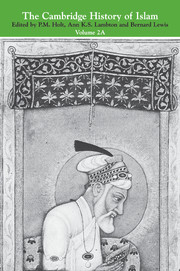Book contents
- Frontmatter
- Introduction
- Part V The Indian sub-continent
- 1 MUSLIM INDIA BEFORE THE MUGHALS
- 2 INDIA UNDER THE MUGHALS
- APPENDIX THE SULTANATES OF THE DECCAN, SIXTEENTH TO EIGHTEENTH CENTURIES
- 3 THE BREAKDOWN OF TRADITIONAL SOCIETY
- 4 INDIA AND PAKISTAN
- Part VI SOUTH-EAST ASIA
- Part VII AFRICA AND THE MUSLIM WEST
- Bibliography
- References
4 - INDIA AND PAKISTAN
from Part V - The Indian sub-continent
Published online by Cambridge University Press: 28 March 2008
- Frontmatter
- Introduction
- Part V The Indian sub-continent
- 1 MUSLIM INDIA BEFORE THE MUGHALS
- 2 INDIA UNDER THE MUGHALS
- APPENDIX THE SULTANATES OF THE DECCAN, SIXTEENTH TO EIGHTEENTH CENTURIES
- 3 THE BREAKDOWN OF TRADITIONAL SOCIETY
- 4 INDIA AND PAKISTAN
- Part VI SOUTH-EAST ASIA
- Part VII AFRICA AND THE MUSLIM WEST
- Bibliography
- References
Summary
Soon after the First World War, Muslim India was involved in a mass political convulsion of a composite nature. Its components were two parallel and mutually linked agitations: a tense and explosive pan-Islamic emotionalism apprehensive of the fate of the defeated Ottoman empire, of the Arab lands (especially the Hijāz), and of the institution of the caliphate; and an alliance with the Hindus in the nationalist and anti-imperialist mass-movement led by the Indian National Congress. These two elements of the agitation were directed against linked objectives: pressure on the government in Britain for a more sympathetic approach in deciding the fate of the vanquished Ottoman empire; and pressure on the British government in India for greater concessions towards self-determination.
The way for a working alliance with Congress had been prepared since 1911 by a series of national and international developments. The annulment of the partition of Bengal (1911), which deprived the Muslims of that province of the political and economic advantage conceded to them earlier, had convinced the Muslim leadership of the instability of British patronage. British action, inaction, or indifference on such developments as the Italian occupation of Libya, or the extension of French control over Morocco, the Balkan War, the suspected designs of a partition of Persia (and possibly Turkey) between Russia and Great Britain, had built up the image of British imperialism as an ally of all European imperialist thrusts directed against the Muslim lands. The annulment of the partition of Bengal had also taught the Muslim political leaders the lesson that the policy of loyalism, initiated by Sayyid Ahmad Khān and followed ever since, did not pay as rich political dividends as the organised movement of political opposition conducted by Congress, or even the terrorism of extremist Hindus.
- Type
- Chapter
- Information
- The Cambridge History of Islam , pp. 97 - 120Publisher: Cambridge University PressPrint publication year: 1977
References
- 1
- Cited by

